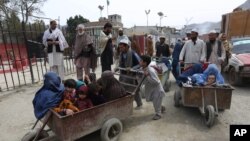Pakistan and Afghanistan on Friday agreed to reopen a main border crossing for thousands of stranded passengers and transit trade convoys, four days after a fencing dispute brought traffic to a halt.
The decision to resume routine border traffic at the northwestern Torkham crossing came after Afghan Ambassador Hazrat Omar Zakhilwal met with Pakistani military chief General Raheel Sharif to discuss the matter and other issues related to border management, said a Pakistani army spokesman.
“Both sides showed resolve to continue efforts to fight terrorism, bring lasting peace in the region,” stated spokesman Lt. General Asim Bajwa, giving details of the meeting in Rawalpindi, where the military is headquartered.
Tensions escalated on Tuesday when Pakistani authorities began installing a fence at “a vulnerable portion” of the border crossing to ensure better management and stop any illegal movement.
Afghan authorities immediately objected and alleged the construction activity was being undertaken on their country's soil, but Pakistan maintained the fence was 30 meters deep inside its territory.
The dispute drew “an offensive attitude” by Afghan border forces and prompted Pakistan to halt the work and consequently close the gate for all kinds of traffic, Pakistani officials said.
Islamabad has long called for Kabul’s cooperation in ensuring strict border controls. Pakistani officials insist such measures will discourage militant movement on either side and help in reducing terrorist acts in both countries.
Afghanistan and Pakistan share a 2,500-kilometer-long porous frontier, known as the Durand Line.
Successive Afghan leaders, however, have for decades refused to accept the demarcations from past British rule of the Indian subcontinent.
Kabul wants to renegotiate the Durand Line but Islamabad rejects the demand, saying the theater has long been settled. The border dispute, critics say, has been the source of other issues dividing the two countries.
Pakistani officials say the fencing at Torkham is part of ongoing efforts to implement strict controls along the entire frontier with Afghanistan and "they will serve interests" of both nations.
The border tensions come at a time when bilateral relations have plunged to new lows over allegations that Islamabad is not preventing the Taliban and militants linked to the Haqqani terror network from using Pakistani sanctuaries to launch attacks in Afghanistan.
Pakistan's foreign policy chief, Sartaj Aziz, again rejected the charges on Thursday.
Pakistan is being blamed “for supporting the Haqqani network without providing any concrete evidence to enable us to take additional action" against the network or other terrorist organizations, Aziz told the national parliament.




